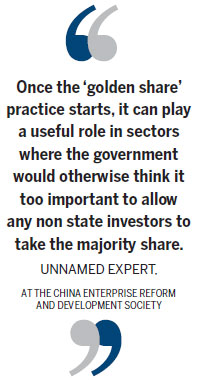State-owned enterprises will soon see key reform

Plan to let State relinquish its majority stake in large corporations but retain veto
An experimental golden share arrangement will play a crucial role in the next stage of the reform of state-owned enterprises, according to informed sources in Beijing.
The introduction of a golden share - a type of preferred share held by the government or a government entity - would allow the state to relinquish its majority shareholding in large national corporations. But it would retain control over the major decisions, such as those in companies in the telecommunications and oil and gas industries, said a source familiar with the reform.
Meanwhile, Zhao Changwen, director of the Department of Industrial Economy under the State Council Development Research Center, told a forum that some state-owned assets would be allowed to convert to preferred shares.
The move would be part of a drive toward SOEs' "total corporatization". However, Zhao did not disclose further details of the new reform plan.
Preferred shares are a type of share that entitles the holder to certain privileges over company restructuring and in profit-sharing, while the golden share is a type of share designed especially to help the government retain the right to a decisive vote.

A long-awaited SOE reform guideline has been approved by the central authorities and its release is only a matter of time, according to the state-owned Assets Supervision and Administration Commission microblog on Sept 7. When approached by China Daily, a commission official declined to disclose the exact date.
Economists have proposed that under China's SOE reform, the golden share should entitle the holder to veto power over key issues such as a revision of the articles of association, another shareholder acquiring shares beyond a set limit, and any attempted takeover or acquisition by another company.
An expert at the China Enterprise Reform and Development Society, who declined to be named, says: "It would be a significant change. Once the golden share practice starts, it can play a useful role in sectors where the government would otherwise think it too important to allow any non state investors to take the majority share.
"State capital would no longer need to retain an absolute controlling stake, because the state would still retain a veto right over major decisions, while private capital may take a majority share and run day-to-day management."
But the official says the golden share arrangement should not apply to SOEs that are either not-for-profit or subject to complete market competition (such as real estate development).
To pave the way for the forthcoming change, the new SOE reform guideline would also divide SOEs into "commercially oriented" and "not-for-profit" types, sources say.
Contact the writers through lanlan@chinadaily.com.cn
(China Daily European Weekly 09/11/2015 page22)
Today's Top News
- Japan tempting fate if it interferes in the situation of Taiwan Strait
- Stable trade ties benefit China, US
- Experts advocate increasing scope of BRI to include soft power sectors
- New engine powers cargo drone expansion
- China to boost green industry cooperation
- Manufacturing PMI rises in November






























